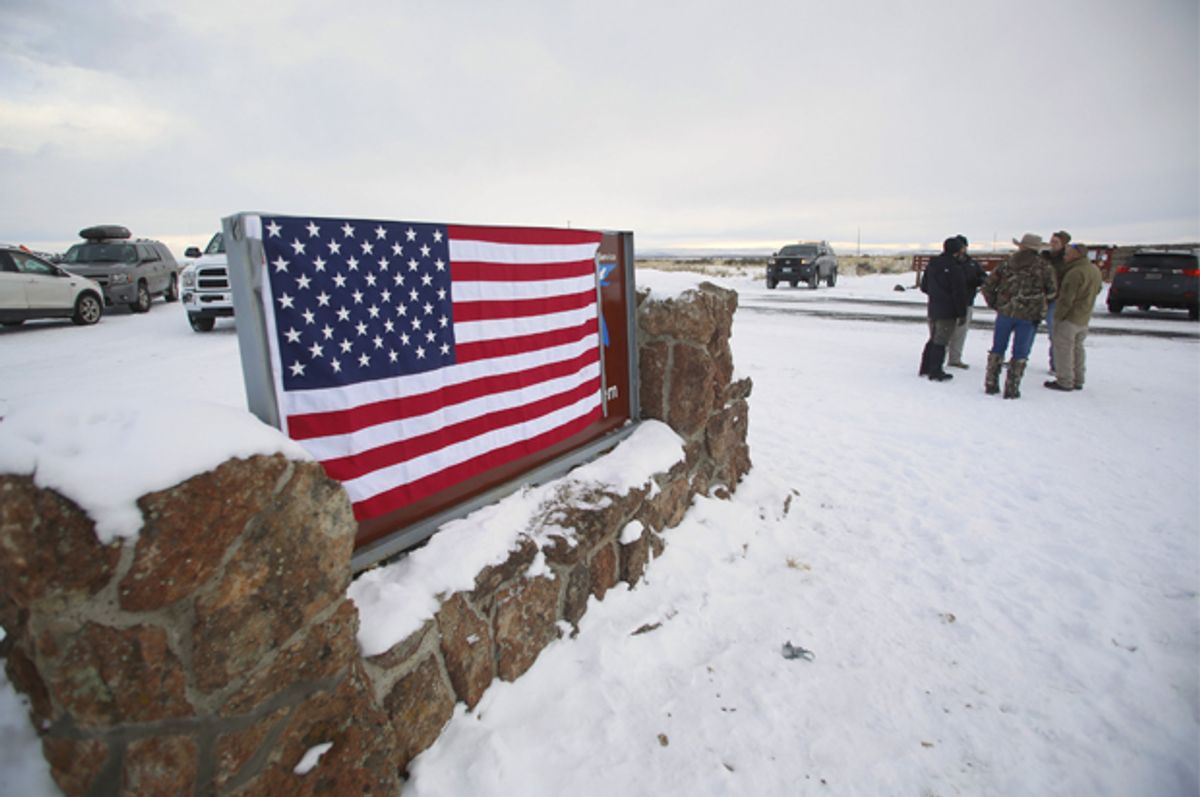If nothing else, events in Oregon have made one thing clear: It turns out that self-styled libertarian extremists object to their actions being treated as terrorism as vigorously as Muslims do -- or left wing environmentalists. That's one of the issues underlying the armed occupation of the Malheur National Wildlife Refuge, led by the son of Cliven Bundy, Ammon, and dozens of like-minded individuals.
Because of the way Congress instituted new punishments for crimes deemed to be terrorism in the wake of the first World Trade Center attack and Timothy McVeigh's 1995 attack on Oklahoma City's federal building, two ranchers will report today to serve out the balance of five year sentences tied to mandatory minimum sentences for arson they had pled guilty to committing.
There are sharply competing stories about what the ranchers -- 73 year old Dwight Lincoln Hammond, Jr. and his 46 year old son, Steven Dwight Hammond -- did to merit a five year sentence. The federal government claims, backed by trial testimony, that the two set a fire in 2001 on Bureau of Land Management land to hide the evidence that Steven had been poaching deer on the land. In addition, Steven started a fire in 2006 that spread onto the Malheur reserve in an attempt to prevent a naturally caused fire from burning his winter feed.
Sources more favorable to the Hammonds claim the Federal government prosecuted them to force them to sell land the government has been trying to integrate into federally managed land for decades. At the very least, some locals appear to believe that the Hammonds were selectively prosecuted for actions that take place commonly with so much private and public land intermingled.
The charges against the Hammonds originally accused them of committing arson four different times, including three different fires in 2006, as well as tampering with a witness; an earlier indictment described arson dating back to 1982, though that charge was dropped. When a jury found them guilty on these two arson charges but continued to deliberate on the others, the Hammonds made a deal to plead guilty to those two, but serve the sentences at the same time. The local judge originally sentenced the father to three months, and the son to a year and a day, even though the charge carried a five year mandatory minimum sentence. The government appealed to get the mandatory minimum, and won at the Ninth Circuit. The Hammonds then appealed to the Supreme Court, but the conservative court -- which has been generally unsympathetic to the kind of Eighth Amendment claims the Hammonds made -- did not take their case.
Both sides may well be substantially correct. The government charged the Hammonds for malicious fires, but the Hammonds emphasized how their property interests have collided with the government's land management decisions going back decades. Still, the Hammonds pled guilty, and the government will generally argue for mandatory minimums. Even some conservative lawyers have argued that what happened with the Hammonds is typical, whether it should be or not.
One solution to this case might be for conservatives to advocate eliminating mandatory sentences for arson as part of the bipartisan criminal justice reform bill currently working through Congress; the bill would also eliminate mandatory minimums for some drug crimes. But that's highly unlikely to happen for two reasons.
As noted, the mandatory minimums were instituted as part of a bill, the Anti-Terrorism and Effective Death Penalty Act, passed in response to a 1993 al Qaeda-related terrorist attack on the World Trade Center and the 1995 McVeigh anti-government militia attack. Arson on federal property got named a terrorist crime along with a bunch of other crimes that now affect alleged Islamic terrorists more than anyone else.
But the arson terrorism designation may well have been most used against the Earth and Animal Liberation Fronts for a series of arsons that started in rural Oregon in 1996 and included a 1997 arson in Burns, Oregon, where this particular occupation started. The ELF/ALF actions were, according to some accounts, a response to a right wing arson protesting the government's conservation decisions. But they were, in any case, the mirror image to the land dispute that underlies the Hammond case. Whereas the Hammonds want the government to leave their access to the land for their private use undisturbed, the leftwing arsonists opposed the mixed use the government administers.
So while the best way to prevent people like the Hammonds from being deemed terrorists for arson deemed by the government to be malicious would be to end mandatory minimums on arson, that won't happen for two reasons: First, because the prosecution as terrorists of activists working to end the kind of mixed use the Hammonds have long enjoyed served their interests. Terrorist convictions against environmentalists helped to eliminate a political opponent fighting over land use decisions.
Moreover, even while Congress moves to eliminate mandatory minimums for drug crimes, it has been increasing mandatory minimums for terrorism crimes.
In an apparent bid to apply for clemency, the Hammonds have distanced themselves from the Bundy's occupation, so the Hammonds' plight is no longer tied to the armed occupation of government facilities. But unless the Bundys stand down while their occupation still consists of a peaceful act of civil disobedience, their own occupation would inch closer and closer to crimes designated as terrorism, and we could start this cycle all over again.




Shares